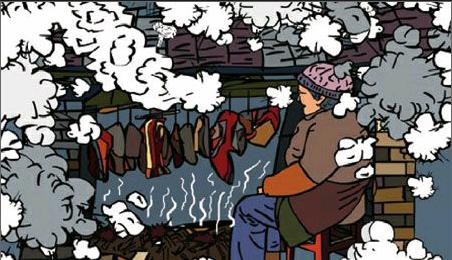Should Bacon Smoking Be Banned to Alleviate Air Pollution?
2015-02-28

Eating preserved pork and sausages represents a long-held tradition in southwest Chinas Chongqing and neighboring Sichuan Province, with many households making smoked bacon in advance of the Chinese Lunar New year, which falls on February 19 this year.
Beginning on January 20, Chongqings environmental watchdog joined forces with public security, city planning, and food and drug authorities to stop bacon smoking across the municipality, in a bid to clean the air and curb acrid smog, as the citys PM2.5—airborne particles smaller than 2.5 microns in diameter that can lodge deeply into the lungs and pose health risks if inhaled—readings have soared exponentially of late.
This ban has caused a wave of controversy around the country, particularly in the southwest, where preparing smoked bacon is a centuries-old tradition.
Some argue that blaming bacon smoking, as opposed to massive industrial pollution, auto exhaust and dust in construction sites for smog and bad air quality demonstrates the local authorities reluctance to face up to the underlying roots of air pollution.
Others say that even though bacon smoking might have contributed to local air pollution, it nonetheless represents an entrenched tradition, and its improper to suddenly impose a ban without taking into account peoples sentimental connection to ancient customs. Perhaps some cleaner ways of making smoked bacon must replace the old ways.
Missing the point
Lei Ruoyu (www.cnhubei.com): Smog can be caused by a multitude of factors. Environmental protection authorities in Chongqing need to identify the main sources of pollution before working out an effective scheme to fight back. The real contributors of pollutants, which in turn lead to smog, lie in industrial production, auto exhaust fumes and dust from urban construction. However, dealing with these contributors is far from easy. Industrial companies often provide huge sources of tax revenue, and auto exhaust fumes arise from the plethora of cars on the streets.
Presumably after some thought, the environmental authorities recognized that bacon smokers represent much easier targets at which to apportion blame. Environmental pollution will be alleviated if proper methods are employed to carefully deal with it. However, if environmental protection authorities fail to make progress in addressing the more problematic causes of pollution and are busy admonishing fringe causative elements, the final consequence may be environmental disaster.
Tuo Xingang (Changsha Evening News): Though bacon smoking instinctively seems highly polluting, the actual air pollution it causes is quite limited. According to a three-day survey conducted at a dozen bacon-smoking sites by Bayu Public Welfare Development Center, a non-governmental environmental protection organization, smoking meat does contribute to air pollution, but only to a small degree. According to the results of the survey, the impact of the smoking process is confined within a 50-meter radius.
It therefore seems ridiculous to cite bacon smoking as a major contributor to air pollution. Today, there is still no consensus on what exactly may have resulted in smog, but one thing is certain: Traffic and industry are likely the major candidates, while family cooking is unlikely to emit significant levels of smoke or particulates.
Dealing with air pollution is not an easy job. Technical and institutional deficiencies can frustrate efforts, but a misleading anti-pollution policy may pose the biggest hindrance. In Los Angeles, local authorities spent 50 years regulating petroleum companies and automakers to rein in smog. Instead of facing up to more deeply rooted causes, environmental authorities in Chongqing are pointing the finger at bacon smoking. In short, it is highly questionable to what extent banning bacon smoking can help clear up smog.
Xu Dafa (comment.scol.com.cn): Local environmental protection authorities seem to have missed the point in dealing with air pollution when imposing a ban on bacon smoking. In actual fact, when properly carried out, bacon smoking does not create intensive levels of smoke, so in this case, technical expertise should be provided, instead of rudely and abruptly banning all bacon-smoking practices.
Bacon smoking is a longstanding culinary tradition, which helps preserve bacon and creates a marvelous flavor. It is also a specialty characteristic of Chinese cooking. Thus, if bacon smoking is prohibited, it is tantamount to abandoning a flavor distinctive to Chinas southwest region, and indeed a whole realm of food culture that is highly popular among the Chinese.
In ancient times, green mountains and clear rivers lay everywhere around the country, with excellent air quality being a given. If bacon smoking had any impact on the degradation of air around them, people at the time did not notice and this practice has since been carried on for centuries. With the arrival of the industrial era, air pollution has become an increasingly severe problem and one that threatens human health. The fundamental cause of air pollution and of smog, the most tangible derivative of air pollution, is industrial waste discharge, rather than bacon smoking. At the very least, local authorities should not so abruptly impose a ban on the practice without first bothering to offer residents technical support to improve their smoking methods.

Changing outdated practices
Li Xiaopeng (Qianjiang Evening News): As its name suggests, bacon smoking necessitates smoke, and usually, the thicker that smoke is and the longer the process lasts, the better the results. With the approach of the Spring Festival, more and more people are engaging in the practice, and thus the PM2.5 ratings issued by Chongqings environmental authorities are credible, which show that local peoples everyday practices, including bacon smoking, now account for 16 percent of PM2.5 emissions, rising from the previous 10 percent.
Some argue that bacon smoking is a treasured local tradition. However, when the preservation of a certain kind of tradition is to be at the expense of the environment and peoples health, the insistence to continue it appears foolish. When the environment is under threat from methods native to certain types of traditional cuisine, its necessary for the public to wave a fond farewell to such outdated techniques.
Zhang Tiankan (The Beijing News): Particulates from bacon smoking do appear to have played a role in the deterioration of local air conditions. The pollutants from bacon smoking will easily mix up with other pollutants and cause even more severe pollution.
It is argued that local people have had smoked bacon for centuries, and no environmental problems ever arose in relation to this custom. Here, we must take into account the accumulation of pollutant factors. In the old days, there were no auto vehicles, fossil fuels or various industries, but today, all of the factors have together aggregated to exacerbate air pollution. Meanwhile, we should take into consideration the twin factors of seasons and surroundings. Winters tend to see people burn fuels to keep warm, in particular coal. In addition, tall buildings in cities block free dissipation of pollutants into the surrounding air. On top of all these contributing factors, now we have particulates from bacon smoking, and as a result, smog forms all too easily.
The banning of bacon smoking should be a temporary policy. After all, its not so wise to all of a sudden outlaw a traditional way of life. The best exit strategy for local authorities would most likely be to encourage residents to use clean energy such as natural gas to prepare their delicacies. Alternatively, people could go to spacious open areas in the countryside in order to smoke bacon, where pollutants will be able to dissipate faster and more easily.
